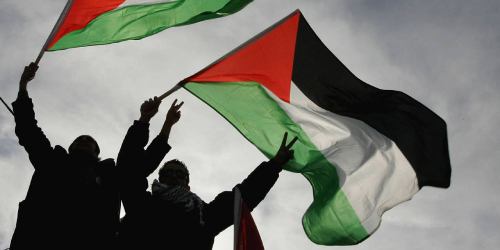11. Cumhurbaşkanı Abdullah Gül, Project Syndicate’te “Filistin Barışının Eksik Parçaları” Başlıklı Bir Makale Kaleme Aldı
27.11.2025

The Missing Ingredients for Peace in Palestine
Following two years of mass killings by Israel in one of the most ruthless military campaigns in recent history, the Gaza ceasefire agreed in October was an undoubtedly welcome step. But even if it holds, the root causes of the problem need to be addressed in order to achieve a just and lasting peace. Otherwise, renewed bloodshed and suffering in the region are inevitable.
Notably, the current ceasefire is US President Donald Trump’s personal project, rather than the continuation of decades of international efforts to solve the Israel-Palestine problem. It does not contain the necessary references to United Nations Security Council Resolutions that refer to a two-state solution with pre-1967 borders and East Jerusalem as the capital of the Palestinian State. Presenting the current peace deal as a “new beginning” thus risks creating the illusion of a solution. While a new UN Security Council Resolution (2803) has legitimized the Trump plan, its references to rightful Palestinian expectations remain insufficient (unlike in the Russian draft).
An especially urgent danger is the normalization of illegal Israeli settlements on Palestinian land. According to a recent International Crisis Group report, Israeli outposts are growing more numerous and are being transformed into permanent settlements. Similarly, the introduction of a “yellow line” in Gaza raises the likelihood of partition, with Israel permanently occupying more than half of the enclave. There are too many reasons to be suspicious of Israel’s intent to withdraw from these territories.
Let us not be naive: the ceasefire is just a beginning. As UN Secretary-General António Guterres has stated, the events in Palestine cannot be seen in a vacuum, independent from their past and current context. Many European countries finally took the step of recognizing the State of Palestine, mainly owing to increasing domestic pressure. Although this may be a superficial step, it signals an important shift in the global approach to the Palestinian cause. Israel remains isolated due to its extremist policies, while international sentiment for a just solution is more vocal than ever.
he platform for peace brought by the Trump plan is new, but the problem at hand, and its main answers, have long been clear. The Israeli invasion and illegal settlements must end, and Palestinian statehood must be achieved with due dignity.
For the ceasefire to lead to a permanent peace, the United States must take charge of swaying Israel in the right direction. Solving the main conflict of the Middle East would be an immense service to humanity. The US would boost its own prestige, while ensuring the safety and prosperity of its closest ally in the region.
Israel’s existential worries are also understandable: it is situated in the middle of the Levant, among many hostile countries. But it should recognize what most Jewish intellectuals and elites around the world understood a long time ago: Israel needs normal relations with Palestinians and its other neighbors. If the alternative is to enforce an apartheid state or strip away Palestinian sovereignty, the conflict will only be postponed and amplified, as has been true in the past.
As long as the invasion continues, resistance will also continue. Merely destroying Hamas will not guarantee Israel’s security, because, in the absence of a just peace, some similarly minded group will inevitably take its place. The only solution is to address the cause of Palestinian radicalization, which starts with allowing Palestinians to live in dignity on their own land.
Peace in Palestine would have effects well beyond the immediate region. Most of the radicalism in the Islamic world exploits claims related to the Palestinian cause. If the conflict is solved, such claims will surely lose traction.
At the same time, Palestinians need to put their own house in order, by elevating leaders who are fully committed to democracy and the rule of law. Only this kind of leadership can truly represent the Palestinian people as a legitimate international interlocutor. This has become even more important since October 7, 2023. The Palestinian leadership must be credible, legitimate, and respectable.
Given the destruction and hardship faced by Palestinians at every level, such political objectives will not be easy to achieve. The international community must be supportive and understanding of the initial efforts to create an acceptable leadership. Israel, too, must support such efforts if it wants to weaken the role of Hamas and achieve regional normalization once and for all.
In 2006, as Turkey’s minister of foreign affairs, I was the first one to receive and meet with Hamas in Ankara following their election victory. I strongly advised them to embrace new policies and act in the way that a democratically elected political force should: they needed to follow diplomacy, adopt more moderate tactics in their struggle, and become the internationally recognized representatives of Palestinians. They showed initial signs that they were willing to do so. I also told my Israeli and American counterparts that the newly elected Palestinian leadership in Gaza should be given a chance. Instead, it was immediately shunned and sanctioned.
Today, a similar opportunity presents itself. I remain convinced that only a democratic Palestinian leadership that ensures good governance, rids itself of corruption, and rejects violence can receive full support from its people and become their legitimate international representative. I have spoken to prominent figures across the Middle East, and many have identified the imprisoned Palestinian politician Marwan Barghouti as an example of a promising leadership candidate. But Israel must demonstrate that it truly desires peace by freeing him and other political prisoners.
The world has grown tired of helplessly watching violence and suffering in Palestine. The Trump ceasefire could be the first step toward peace, but only if it evolves into a full-fledged plan that recognizes and appreciates the decades-long Palestinian struggle. Otherwise, the suffering of Palestinians and the insecurity of Israelis will continue.